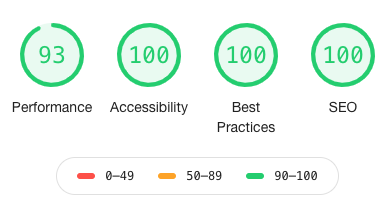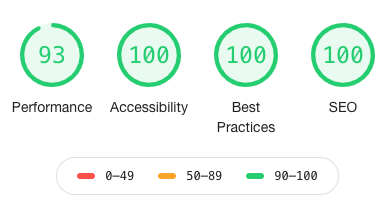
How does your website score?
TJS has been developing websites for over twenty years and in the beginning, when there were very few off the shelf packages available, we built everything ourselves, with a backdrop of excessively slow internet connections. Our rationale was to build sites that loaded rapidly and effectively on the available devices.
Today, we continue to build sites that offer a fast and engaging experience for site visitors, in order to satisfy Google, the most frequently used search engine in the world with a UK market share in excess of 90%. For a few years, we have used WordPress for a number of clients who have been familiar with the platform and who wanted to continue using it. However, the perceived trade off between the simplicity of a framework for a client, versus the inherent ‘bulk’ that accompanies it (bespoke theme or not), is one that has never sat easy with us; the interactions, code and bulk that comes with an off the peg platform is increasingly reducing the commercial worthiness of a website, in Google’s eyes.
In order to satisfy the Google Algorithm, and bearing in mind that Google captures over 80% of mobile traffic, there are a number of criteria that need to be satisfied for a website to yield the best possible results.
Google’s Lighthouse test was initiated in order to help developers understand the importance of a variety of technical elements. The Lighthouse test scores a website’s performance in four areas; performance, best practice, accessibility and SEO.
With almost 4,000 million mobile internet users and 90% of all internet users having mobile access in 2019 (hostingtribunal.com), Google’s main requirement is that a site is mobile friendly, ranking it on its’ performance ‘mobile first’. In real terms, this means that if your website has bloated images, rotating banners or text and links that are too small to click or read on a mobile device, you could be marked down.
In terms of accessibility, the Lighthouse test scores a website when viewed on the lowest common denominator i.e. a weak 3G signal on an older, slower device. Simply put, it views a page with the same eyes as a user on an old phone with a poor connection. Although this may feel like setting a page up to fail (after all, the most optimised page would struggle in such a scenario), the idea is to improve speed, and with over half of mobile users bouncing away from a page that takes longer than 3 seconds to load, anything that will increase website speed and performance has to be taken seriously. If Lighthouse could improve the performance of a page under such poor conditions, imagine what it can do on the latest device on the fastest network!
After seeing that our own website was underperforming in the Lighthouse test, and in order to put our money where our mouth is, we have recently honed our bespoke platform to be even more effective.
Looking at our own Lighthouse scores, you can see that we have managed to balance as high a score as possible with the commercial realities of building an easy to navigate site where information can be located and accessed quickly and effectively.

As the above visual demonstrates, the information that the Lighthouse test scores provide isn’t just relevant for mobile sites but is useful for improving the efficiency of any site. Scores are out of 100, with a good score being 90-100, an average score 50-89 and a poor score 49 and below. Any score of 90 or above will, according to Google, place you in the top 5% of top-performing sites. As the illustration above demonstrated when we ran the test a number of times, TJS had 4 of them!
While ‘ticking the boxes’ does not guarantee you the number 1 spot, it does show Google that your site is in the best possible shape and that you understand the requirements of your site visitors, but many clients are understandably anxious at the perceived cost of a bespoke site. This is no longer the case.
It does not cost the earth to have a bespoke website and at TJS, we have invested in an optimised framework that is accessible to all and that allows us to help your business have the maximum chance of success on the web.
In view of the challenges the world has recently faced, and with more and more people and businesses turning to the internet, how confident are you in your website’s performance? How does your site fare? Is your off the peg website in the best possible position to be accessed by this increased traffic to the web? Is it as healthy as can be?
If the answer to these questions is ‘not very’ or ‘no’, then call us today on 01507 525 500 and take up the TJS Challenge to find out what your Lighthouse scores are!


